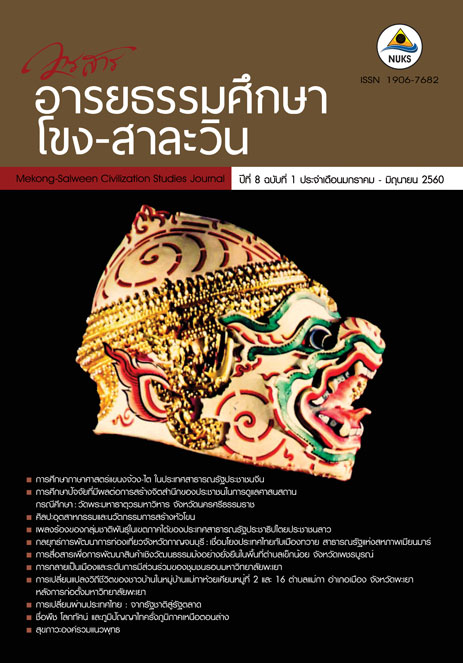การเปลี่ยนผ่านประเทศไทย : จากรัฐชาติสู่รัฐตลาด Thailand's the transitional from Nation State to Market State
Main Article Content
Abstract
บทคัดย่อ
งานวิจัยนี้มีวัตถุประสงค์เพื่อศึกษาบริบทของการเปลี่ยนผ่านประเทศไทยจากรัฐชาติสู่รัฐตลาด เป็นการวิจัยเชิงคุณภาพ เป็นการวิจัยเอกสาร (documentary research) และการสัมภาษณ์ (interview) แบบเจาะลึก (in-depth interview) ประชากรวิจัยมาจากบุคคลที่มีความรู้ความเข้าใจความเปลี่ยนแปลงของประเทศไทย จากรัฐชาติสู่รัฐตลาด ที่มีความหลากหลาย ทั้งจากชนชั้นนำ นักการเมือง นักวิชาการ พ่อค้านักธุรกิจ ข้าราชการ ประชาชน กลุ่มตัวอย่างจากนักวิชาการที่มีผลงานที่เกี่ยวข้อง
ผลการศึกษา พบว่า การเปลี่ยนผ่านจากรัฐชาติสู่รัฐตลาดพิจารณาจากบริบทภายนอกและบริบทภายใน ดังนี้ (1) การเปลี่ยนผ่านประเทศไทยจากบริบทภายนอกที่มีสาเหตุมาจากโลกาภิวัตน์ก่อให้เกิดความเปลี่ยนแปลงสามด้าน คือ ด้านการเมือง จากต่างประเทศที่มีการปรับเปลี่ยนองค์ประกอบของรัฐทั่วโลก การแพร่ขยายแนวคิดการจรรโลงประชาธิปไตย และการปฏิรูปการเมืองเพื่อทำให้ประชาธิปไตยเข้มแข็ง ด้านเศรษฐกิจ มาจากความเปลี่ยนแปลงด้านการพัฒนาระหว่างประเทศที่กำหนดยุทธศาสตร์การพัฒนาตามแนวทางทุนนิยม การค้าระหว่างประเทศที่มุ่งเน้นการค้าเสรี การเงินระหว่างประเทศที่ก่อให้เกิดวิกฤตการณ์ทางเศรษฐกิจในเอเชียใน พ.ศ. 2540 การลงทุนระหว่างประเทศจากบทบาทของบรรษัทข้ามชาติ และความช่วยเหลือระหว่างประเทศจากการรับความช่วยเหลือของประเทศไทยภายหลังวิกฤตการณ์ทางเศรษฐกิจใน พ.ศ. 2540 ด้านสังคม มาจากการเพิ่มบทบาทของประชาสังคมที่มีผลกระทบทุกด้าน (2) การเปลี่ยนผ่านประเทศไทยจากบริบทภายในที่นำไปสู่การปรับตัวของประเทศสามด้าน คือ ด้านการเมือง มาจากการถือกำเนิดของรัฐธรรมนูญแห่งราชอาณาจักรไทย พ.ศ. 2540 นำมาสู่ความเปลี่ยนแปลงของรัฐอย่างกว้างขวาง ด้านเศรษฐกิจ มาจากบทบาทของกลุ่มทุนที่ครอบงำรัฐภายหลังชัยชนะในการเลือกตั้งของพรรคไทยรักไทยใน พ.ศ. 2544 ด้านสังคม มาจากการแทรกแซงของรัฐจนกลายเป็นประชาสังคมโดยรัฐ
Abstract
The objective of this research is to study the context of Thailand’s transition from the national state to the market state. These study was conducted by a qualitative research and using a documentary research technic and in-depth interview technic. The research population comes from a diverse person with knowledge of the changes situation from the national state to the market state such as the elite person, politicians, academics, businessmen, merchants, public officials, and scholars whose work involved.
The study found that the transition from national state to market state can considering into external context and internal context. (1) The transition in the context of external factor is come from globalization. These factor can be considering as 3 categories. First, the political of other countries that adopt the composition of its state worldwide, the diffusion of sustain democracy concept, the political reforms to strengthen democracy. Second, changes in the economic by development of international in order to point its strategy that follow by capitalism, international trade focused on free trade, international monetary causing the economic crisis in Asia in 1997. Third, social that result from increasing role of civil society and affecting all aspects. (2) The transition of internal context of Thailand. This context led to the adaptation of the country in 3 categories. First is political, the advent of the constitution of the Kingdom of Thailand BE 2540 led to widespread changes in Thailand state. Second, Economic factor that result from role of the capital group overwhelming electoral victory of the Thairakthai Party in BE 2544. Third, Social factor, result from the interference of the state into civil society by the state.


